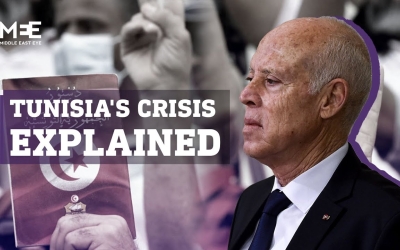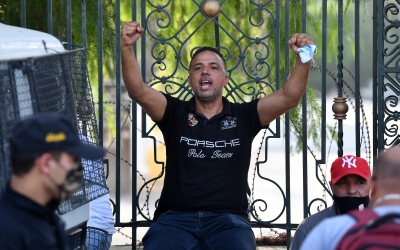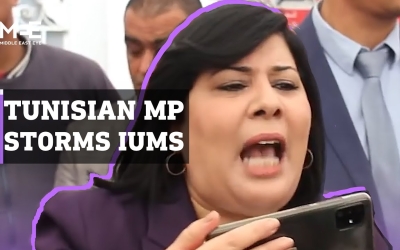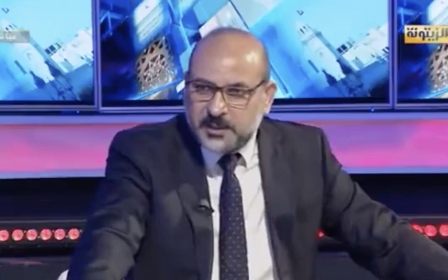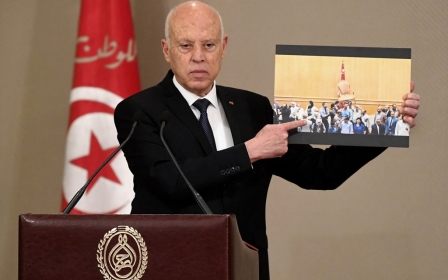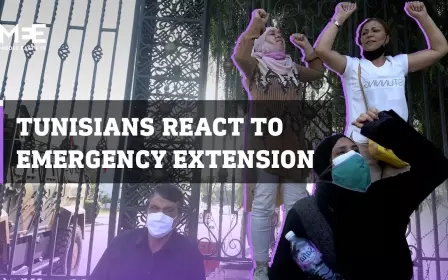Political parties fight for survival in Kais Saied's post-coup Tunisia
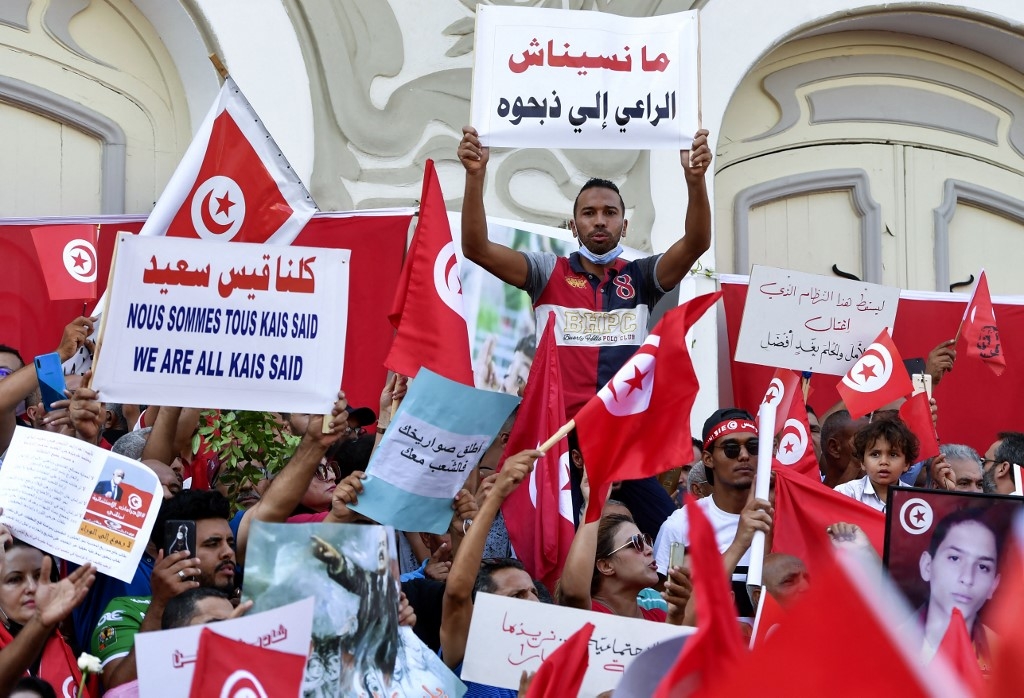
The date 25 July 2021 will undoubtedly stand out as an historic day in Tunisia. By declaring a state of emergency and suspending all parliamentary activities, President Kais Saied unleashed a tsunami that swept up the entire political class.
One hundred days after the coup, political parties - whether in power or in opposition - are struggling to survive in the face of an omnipotent and still very popular president.
The first victims of the July coup were most certainly the members of the parliamentary majority who supported the government of former prime minister Hichem Mechichi.
The Islamo-conservative party Ennahdha - with the largest bloc in the Assembly of the Representatives of the People (ARP) and having served as a member of every coalition in power since the 2011 elections - has suffered an unprecedented loss of members. A significant chunk of the public holds the bloc responsible for the country's failings in the past decade.
Its leader, Rached Ghannouchi, who is also parliament speaker, has very little support outside of his immediate circle.
Ghannouchi tried to organise protests in front of parliament, but few activists turned up. He also refused to disavow the chairman of the party's Shura Council, Abdelkarim Harouni, whose actions triggered the 25 July protests.
Harouni had demanded financial reparations for the victims of the country’s dictatorship at a time when the country was going through the deadliest wave of the epidemic, lacking vaccines and oxygen, and had given the government an ultimatum.
Saied's legacy
A few hours after Saied announced the suspension of parliament in July, Ghannouchi tried to visit the Assembly's headquarters alongside his vice president, Samira Chaouachi, but was prevented from doing so by a soldier.
A video of this scene went viral and has since become part of Saied's legacy.
The presidential power grab has aggravated the crisis of governance that Ennahdha’s movement had been experiencing for years, especially as it pertains to Ghannouchi’s prerogatives as a leader and his desire to remain at the head of the party beyond the two terms allowed in its constitution.
In September, about 100 of the party's leaders - including the very popular Abdellatif Mekki - chose to resign. Some of them are considering launching a new conservative political party that would go beyond the Islamist framework. So far, all of Ennahdha's political acrobatics have failed to land a viable compromise.
The hindrances working against the main Islamist party are its human rights record and its history of political reversals. Saied’s supporters have sought to discredit any discourse denouncing the excesses of the new regime by reverting to criticisms of the combination of political realism and accusations of human rights violations - notably during the repression of a demonstration using buckshot volleys in Siliana - that have plagued Ennahdha during the past decade.
This stained reputation has affected the entire political class, including those who have systematically denounced human rights violations.
Created in 2019, a few months before the general elections, the Heart of Tunisia party (Qalb Tounes) managed to get the second place in the last legislative and presidential elections.
Centred very much on the cult of its president Nabil Karoui and without a real political agenda, it quickly lost some of its members and voters for breaking its promise not to ally with Ennahdha.
Sitting initially on the opposition benches, Karoui managed to bring down Elyes Fakhfakh's government before later supporting his successor Hichem Mechichi. Karoui also shares responsibility for the catastrophic management of the health crisis.
After the 25 July events, the president of the parliamentary group Oussama Khelifi had initially declared his support for Karoui's approach, before changing his mind and joining the opposition.
At the end of August, the brothers Nabil and Ghazi Karoui, president and deputy of the party, respectively, entered Algeria illegally and were arrested. Prosecuted since 2019 for money laundering and tax evasion - accusations that earned Nabil two stays in detention - they are now the subject of an official extradition request from Tunis.
Last month, a television station own by Nabil was shut down by the government for "operating without a licence".
Faced with this political and judicial debacle, several MPs have chosen to resign from a party that they say has become "an empty shell".
Dignity Coalition clamp down
A loyal ally of Ennahdha, the Islamo-populist grouping Dignity Coalition (al-Karama) has made a name for itself after a few bold moves.
In addition to launching verbal attacks against opponents of the Islamist camp, deputies from this movement have also been involved in provoking violence in the region and organising disturbances at Tunis-Carthage airport, the country's main border point, in an attempt to force border authorities to allow a passenger on the "S17 list" to board a plane.
The "S17 list" is a procedure that allows the police to restrict the movements of individuals suspected of terrorism without a judge's authorisation.
Many of al-Karama's figures are being prosecuted in various legal cases related to their mandates or for acts prior to Saied coming into power in 2019, such as incitement to join the ranks of the Islamic State group in Syria or theft of legal documents related to terrorism cases.
Today, al-Karama's leader, Seifeddine Makhlouf, is in jail for contempt of court.
Another al-Karama member, Nidhal Saoudi, was prosecuted for the so-called "airport incident" in which he was accused of "insulting security personnel" in March as part of a demonstration against the country's travel bans. In his case, the suspects Mohamed Affes and Maher Zid are currently on the run, and the latter has just been sentenced in absentia to four years in prison.
The repositioning of Abir Moussi
Abir Moussi, whose popularity comes from her political stance that radically opposes the Islamists, seems to be competing head-to-head against Saied, who has succeeded, for the first time in 10 years, in excluding Ennahdha and its allies from power.
The leader of the Free Destourian Party (or PDL, by its French acronym) has managed to find new political ground, rejecting the political system that emerged from the 2011 revolution and opposing the concentration of power in the hands of Saied, who she claims is close to other Islamist movements.
Trained as a lawyer, she has previously denounced presidential decisions that she considers illegal and unconstitutional.
While she still cultivates a relationship with the former regime, whose authoritarian nature she has never condemned, Moussi has never stopped speaking out against the attacks on civil liberties observed since 25 July.
Opinion polls continue to put her in the lead in possible legislative elections. Today, she has emerged as the only real opposition to Kais Saied.
The Democratic Group, the second largest parliamentary bloc in the Assembly, composed mainly of the Attayar (social-democratic) and al-Chaab (Arab nationalist) parties, now finds itself divided on what to do about Saied.
While both parties supported the application of Article 80 - the article of the constitution used by the head of state to justify his coup d’etat) on 25 July, albeit with reservations on Attayar’s side - they disagreed on the extension of the state of emergency in August and, even more so on the 22 September 2021 announcement of the Decree 117, which grants overwhelming executive powers to the president and suspends whole sections of the constitution.
The Attayar party sees this as authoritarian drift aimed at taking advantage of the current crisis to impose Saied’s political project. The president did not appreciate this change of position and accused its leaders, without naming them directly, of "opportunism".
Attayar has also joined a coalition of parties ranging from the centre-right to the centre-left that have now opposed Saied's power grab. The presence of Fadhel Abdelkafi (the former Minister of Finance and a supporter of Nabil Karoui and the current president of the social-liberal party Afek Tounes) in this bi-partisan coalition has led to criticism, including in circles close to Mohamed Abbou’s Attayar movement.
A party that won’t say its own name
Al-Chaab, or the People's Movement, which backs regimes that have shown little interest in democracy and human rights, has enthusiastically supported the president’s approach.
However on recent weeks, the party's leaders have toned down their support for the government when Saied made it clear that the national dialogue he intended to conduct would exclude all intermediary bodies, including pro-25 July political groups and national organisations such as the UGTT, the country’s main trade union.
Many of al-Chaab's leaders come from the powerful central trade union. The party’s new position will undoubtedly become more pronounced if the president continues to promote a political agenda that could eventually signal the disappearance of all political parties.
Finally, there is a party that has no name, which is made up of Saied's allies and, somewhat paradoxically, supports the end of political parties altogether.
This group has organised meetings, given press conferences, attended political broadcasts, and reached out to citizens to promote the president's agenda.
But since the group does not have legal existence, they have been able to bend constitutional formation rules without being disavowed by Saied.
The latest polls indicate that the hypothetical "party of Kais Saied" would come in second if early legislative elections are organised under the current electoral law. Saied himself, however, has always refused to lead a political movement.
This article was translated from MEE's French website.
Middle East Eye delivers independent and unrivalled coverage and analysis of the Middle East, North Africa and beyond. To learn more about republishing this content and the associated fees, please fill out this form. More about MEE can be found here.


